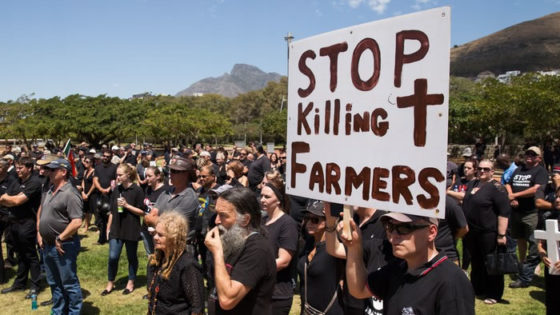by Mac Slavo, SHTF Plan:

U.S. President Donald Trump has threatened to cut off all future funding to South Africa due to the country’s new land expropriation law, which will lead to the confiscation of land from white farmers. Trump says it is a “massive” human rights violation against white people.
Elon Musk has also criticized the South African government’s land reform policies, accusing them of being anti-white and allowing a “genocide” against white farmers.
The South African government, led by President Cyril Ramaphosa, has denied these claims, stating that the law is aimed at addressing the legacy of apartheid and promoting land reform.
TRUTH LIVES on at https://sgtreport.tv/
The new land expropriation law in South Africa allows for the government to acquire land from private parties without compensation in certain circumstances, such as if the land is not being used or if it poses a risk to the public.
Some groups have warned that the law could lead to a situation similar to the seizure of white-owned commercial farms in Zimbabwe. Officially called “land reform,” the reality is it was a hideous land grab by a tyrannical government that devastated the country.
Zimbabwe’s Land Grab
Zimbabwe’s land grab, initiated in 2000 under President Robert Mugabe, known as Africa’s Hitler, involved the expropriation of white-owned farms without compensation. This policy aimed to redistribute land from white Zimbabweans to black Zimbabweans, addressing historical grievances from the colonial period. However, the land was not given to ordinary black Zimbabweans; it was handed over to ruling party officials and Mugabe’s friends. Mugabe’s land grab has had severe and deadly consequences, which still impact the country 25 years later.
The Zimbabwe government’s land grab was marked by violence and intimidation against white farmers, leading to deaths and displacement. The land grab exacerbated tensions between different groups – ZANU-PF supporters and the rest of the population – and contributed to political instability. It also led to the displacement of farm workers and the loss of jobs for many Zimbabweans. Agricultural output declined, contributing to Zimbabwe’s economic collapse, including hyperinflation and food shortages, resulting in the breadbasket of Africa becoming a basket case, dependent on food imports.
In the Fort Lauderdale News on 24 September 1974, the reporter Paul Scott wrote: “It is Kissinger’s belief, according to aides, that by controlling food one can control people, and by controlling energy, especially oil, one can control nations and financial systems.” Many have shortened this quote to: “He who controls the food controls the people.” It is this sentiment that many Zimbabweans have always believed was the motivation behind Mugabe’s land grab. Once the population felt the effects of food shortages and Zimbabweans were reduced to near starvation, Mugabe used the distribution of food aid as a political tool to influence votes known as “food for votes.” The first recorded use of this inhuman practice began in the lead-up to the 2002 presidential election, and it continues to this day.
Further reading:
- Trump plans to cut US funding to South Africa over land law. Musk has also criticized the country, AP News, 3 February 2025
- Farmer Bill and his wife, the private owners of more farmland than anyone else in America, The Exposé, 21 April 2022
- How To Kill A Country, The Atlantic, December 2003
- Scorched Earth in Zimbabwe: Before and After Satellite Photos, Centre for Global Development
South Africa’s Land Grab
In 2023, Elon Musk, the Pretoria-born billionaire who owns X (Twitter) and Tesla, feared that a crime against humanity was at risk of unfolding in South Africa. He wrote that he’d heard of calls for “a genocide of white people” in his former homeland.
Musk wasn’t alone in his concerns. Steve Hofmeyr, a South African singer with a cult following, thought that the “g-word” was an appropriate way to describe what was unfolding: “If you think that the slaughter of South African farmers is not genocide enough, ask them about their land, language, religion, education, universities, heritage, monuments, safety, dignity and the race-based regulations imposed upon them and their children.”
Trump voiced a similar concern when he was in the White House for the first time. In a tweet that caused a diplomatic bust-up between South Africa and the United States in 2018, Trump referred to the “large-scale killing of farmers.”





